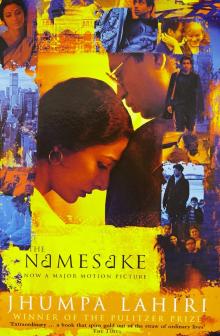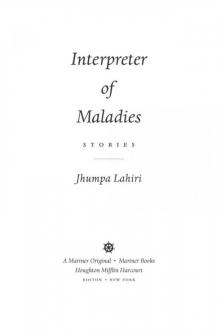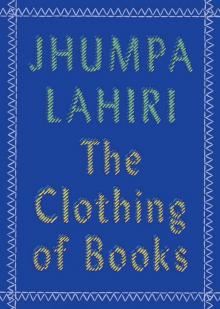- Home
- Jhumpa Lahiri
The Lowland Page 6
The Lowland Read online
Page 6
It was an afternoon everyone, including Manash, happened to be out, and she’d been reading, alone. She wondered if he’d turn back, given that Manash wasn’t there. Instead, a moment later, he stepped out onto the balcony.
No one else here? he asked.
She shook her head.
Will you talk to me, then?
The laundry was damp, some of her petticoats and blouses were clipped to the line. The material of the blouses was tailored to the shape of her upper torso, her breasts. He unclipped one of the blouses and put it further down the line to make room.
He did this slowly, a mild tremor in his fingers forcing him to focus more than another person might on the task. Standing beside him, she was aware of his height, the slight stoop in his shoulders, the angle at which he held his face. He struck a match against the side of a box and lit a cigarette, cupping his whole hand over his mouth when he drew the cigarette to his lips. The houseboy brought out biscuits and tea.
They overlooked the intersection, from four flights above. They stood beside one another, both of them leaning into the railing. Together they took in the stone buildings, with their decrepit grandeur, that lined the streets. Their tired columns, their crumbling cornices, their sullied shades.
Her face was supported by the discreet barrier of her hand. His arm hung over the edge, the burning cigarette was in his fingers. The sleeves of his Punjabi were rolled up, exposing the veins running from his wrist to the crook of the elbow. They were prominent, the blood in them greenish gray, like a pointed archway below the skin.
There was something elemental about so many human beings in motion at once: walking, sitting in busses and trams, pulling or being pulled along in rickshaws. On the other side of the street were a few gold and silver shops all in a row, with mirrored walls and ceilings. Always crowded with families, endlessly reflected, placing orders for wedding jewels. There was the press where they took clothes to be ironed. The store where Gauri bought her ink, her notebooks. Narrow sweet shops, where trays of confections were studded with flies.
The paanwallah sat cross-legged at one corner, under a bare bulb, spreading white lime paste on stacks of betel leaves. A traffic constable stood at the center, in his helmet, on his little box. Blowing a whistle and waving his arms. The clamor of so many motors, of so many scooters and lorries and busses and cars, filled their ears.
I like this view, he said.
She’d observed the world, she told him, all of life, from this balcony. Political processions, government parades, visiting dignitaries. The momentous stream of vehicles that started each day at dawn. The city’s poets and writers passing by after death, their corpses concealed by flowers. Pedestrians wading knee-deep through the streets, during the monsoon.
In autumn came the effigies of Durga, and in winter, Saraswati. Their majestic clay forms were welcomed into the city as dhak were beaten, as trumpets played. They were ushered in on the backs of trucks, then carried away at the end of the holidays to be immersed in the river. These days students were marching up from College Street. Groups in solidarity with the uprising at Naxalbari, carrying flags and placards, raising their fists in the air.
He noticed the folding chair on which she’d been sitting. It had a sagging piece of striped fabric, like a sling, for a seat. A book was neglected beside it. A volume of Descartes’s Meditations on First Philosophy. He picked it up.
You read here, with all this going by?
It helps me to concentrate, she said.
She was used to the noise as she studied, as she slept; it was the ongoing accompaniment to her life, her thoughts, the constant din more soothing than silence would have been. Indoors, with no room of her own, it was harder. But the balcony had always been her place.
When she was a little girl, she told him, she would sometimes stumble out of bed during the night, and her grandparents would find her in the morning, fast asleep on the balcony, her face against the blackened filigree, her body on the stone floor. Deaf to the traffic that rumbled past. She had loved waking up out-of-doors, without the protection of walls and a ceiling. The first time, seeing that she was missing from the bed, they thought she had disappeared. They had sent people down to the street to search for her, shouting her name.
And? Udayan asked.
They discovered that I was here, still sleeping.
Did your grandparents forbid you from doing it again?
No. As long as it wasn’t too cold or raining, they left a little quilt out for me.
So this is your bodhi tree, where you achieve enlightenment.
She shrugged.
His eyes fell to the pages she’d been reading.
What does Mr. Descartes tell us about the world?
She told him what she knew. About the limits of perception and the experiment with a piece of wax. Held up to heat, the essence of the wax remained, even as its physical aspect changed. It was the mind, not the senses, that was able to perceive this, she said.
Thinking is superior to seeing?
For Descartes, yes.
Have you read any Marx?
A little.
Why do you study philosophy?
It helps me to understand things.
But what makes it relevant?
Plato says the purpose of philosophy is to teach us how to die.
There’s nothing to learn unless we’re living. In death we’re equal. It has that advantage over life.
He handed the book back to her, closing it so that he caused her to lose her place.
And now a degree has become meaningless in this country.
You’re getting a master’s in physics, she pointed out.
My parents expect me to. It doesn’t matter to me.
What matters to you?
He looked down at the street, gesturing. This impossible city of ours.
He changed the subject, asking about the others who lived with her and Manash: two uncles, their wives, two sets of children. Her maternal grandparents, who had once owned the flat, were dead, as were her own parents. Her older sisters lived elsewhere, scattered here and there, now that they were married.
You all grew up here?
She shook her head. There had been various homes in East Bengal, in Khulna, in Faridpur, where her parents and sisters had once lived. Her father was a district judge, and her parents and her sisters had moved every few years from place to place, to beautiful bungalows paid for by the government, in pretty parts of the countryside. The houses had come with cooks, servants who’d opened the doors.
Manash was born into one of these homes. He barely remembered, but her sisters still spoke of that phase of their upbringing, their shared past. The teachers who would come to give them dance and singing lessons, the marble tables on which they ate meals, the broad verandahs on which they played, a separate room in the house that was just for their dolls.
In 1946 those postings ended, and the family came back to Calcutta. But after a few months her father said he did not want to live out his retirement there. After a lifetime outside it, he had no patience for city life, especially when its people were butchering each other, when entire neighborhoods were going up in flames.
One morning during the riots, from the same balcony Gauri and Udayan were standing on now, her parents had witnessed a scene: a mob surrounding the Muslim man who delivered their milk on his bicycle. The mob was seeking revenge; it was reported that a cousin of the milkman had been involved in an attack on Hindus in some other part of the city. They watched one of the Hindus plunge a knife into the ribs of the milkman. They saw the milk the family would have drunk that day spilling onto the street, turning pink with his blood.
So the family moved to a village west of Calcutta, a few hours away. In an uneventful place, removed from their relatives, protected from turmoil, her parents preferred to establish their final domain. There was a pond to fish and wade in, chickens for their eggs, a garden her father liked to tend. Nothing but farmland, dirt roads, sky and t
rees. The closest movie theatre was twenty miles away. A fair brought booksellers once a year. The darkness at night was absolute.
By the time Gauri was born, in 1948, her mother was already preoccupied with settling the marriages of her older sisters. Her sisters belonged almost to another generation: teenaged girls when she was an infant, young women when she was a child. She was an aunt to children her own age.
How long did you live in the countryside?
Until I was five.
Her mother was bedridden around that time. She’d had tuberculosis in her spine. Gauri’s older sisters had been useful, helping with household chores, but she and Manash were only a complication. So they were sent away to the city, cared for by their grandparents, in the company of their aunts and uncles.
After her mother was on her feet again they had stayed on. Manash had enrolled at Calcutta Boys’ School, and Gauri didn’t want to be without Manash. When it was her turn to start school, given that the city’s schools were better, it made sense for her to remain.
There had always been the option to return to her parents’ village. But though she visited, taking the train to see them for holidays, rural life held no appeal for her. She didn’t think she resented her parents for not raising her. It was the way of many large families, and considering the circumstances, it was not so strange. Really, she appreciated them for letting her go her own way.
That was their gift to you, Udayan said. Autonomy.
A motor accident on a mountain road had killed them. They were traveling in bad weather to a hill station, for a change of scene. Gauri had been sixteen. The house was sold, no trace of her family in that quiet place remained. It was a blow to lose them suddenly, but her grandparents’ deaths, more recently, had saddened her more. She’d grown up in their home, slept on a bed between them. She’d seen them day after day, watched them turn ill and frail. It was her grandfather, who’d been a professor at the Sanskrit College, who’d died with a book on his chest, who’d inspired her to study what she did.
She saw that the unremarkable journey of her life thus far was fascinating to him: her birth in the countryside, her willingness to live apart from her parents, her estrangement from most of her family, her independence in this regard.
He lit another cigarette. He told her his childhood was different. There was only himself and a brother. It had been only the two of them and their parents, in a house in Tollygunge.
What does your brother do?
He talks these days of going to America.
Will you go, too?
No. He turned to look at her. And you? Will you miss all this, when you get married?
She saw that his mouth never fully closed, that there was a diamond-shaped aperture at the center.
I’m not getting married.
Your relatives don’t pressure you?
I’m not their responsibility. They have their own children to worry about.
What would you do instead?
I could teach philosophy at a college or a school.
And stay here?
Why not?
That’s good. For you, I mean. Why should you leave a place you love, and stop doing what you love to do, for the sake of a man?
He was flirting with her. She felt him forming an opinion even as he stood there looking at her, talking to her. An aspect of her, in his mind, that he already possessed. He’d plucked it from her without permission, a transaction no other man had attempted, one that she could not object to, because it was him.
After a moment, pointing toward the intersection, he said:
If you married someone who lived on one of these other three corners, if you only had to move to one of the other balconies, would it be all right then?
She couldn’t help herself; she smiled at this, at first hiding the smile with her hand. Then laughing, looking away.
They began meeting at his campus, and at hers. But now, even when they hadn’t arranged a meeting, they kept running into each other. He would walk through the gates over to Presidency, watching as she came down the great staircase after a class. They sat along the portico, draped with banners the Students’ Union put up. When speeches were delivered on the quadrangle, about the continuing rise in food prices, about the growing population, about the shortage of jobs, they listened to them together. When marches sprouted along College Street, he brought her along.
He started giving her things to read. From the bookstalls he bought her Marx’s Manifesto, and Rousseau’s Confessions. Felix Greene’s book on Vietnam.
She saw that she impressed him, not only by reading what he gave her, but by talking to him about it. They exchanged opinions about the limits of political freedom, and whether freedom and power meant the same thing. About individualism, leading to hierarchies. About what society happened to be at the moment, and what it might become.
She felt her mind sharpening, focusing. Wrestling with the concrete mechanisms of the world, instead of doubting its existence. She felt closer to Udayan on the days she did not see him, thinking about the things that mattered to him.
At first they tried to keep things a secret from Manash, only to find out that Manash had been quietly plotting it; that he’d been certain the two of them would get along. He made it easier for Gauri to spend time with Udayan, explaining away to the rest of the family where she’d gone.
Their partings were abrupt, the attention he paid her suddenly coming to an end because there was somewhere he had to go. Some meeting, some study session, he never fully explained. He never looked back at her but always paused in a spot where she was sure to see him, raising his hand in farewell before cupping it to light a cigarette, and then she watched his long legs carrying him away from her, across campus, or across the wide and busy street.
He talked sometimes about traveling, going to one of the villages where she might have been raised had she not fled. Where after Naxalbari, she gathered, life was not so quiet anymore.
He wanted to see more of India, he said, the way Che had traveled through South America. He wanted to understand the circumstances of its people. He wanted to see China one day.
He mentioned certain friends who had already left Calcutta, to live among the peasants. Would you understand, if I ever needed to do something like that? Udayan asked her.
She was aware that he was testing her. That he would lose respect if she turned sentimental, if she was unwilling to face certain risks. And so, though she did not want him to be away from her, did not want any harm to come to him, she told him that she would.
Without him she was reminded of herself again. A person most at ease with her books, spending afternoons filling her notebooks in the cool high-ceilinged reading room of Presidency’s library. But this was a person she was beginning to question after meeting Udayan. A person that Udayan, with his unsteady fingers, was firmly pushing aside, wiping clean. So that she began to see herself more clearly, as a thin film of dust was wiped from a sheet of glass.
In childhood, aware of her accidental arrival, she had not known who she was, where or to whom she’d belonged. With the exception of Manash she had not been able to define herself in relation to her siblings, nor to see herself as a part of them. She had no memory of spending a moment, even in a house in such an isolated place, ever, alone with her mother or father. Always at the end of a queue, in the shadow of others, she believed she was not significant enough to cast a shadow of her own.
Around men she’d felt invisible. She knew she was not the type they turned to look at on the street, or to notice across the room at a cousin’s wedding. She’d not been asked after and married off a few months later, as some of her sisters had been. She was a disappointment to herself, in this regard.
Aside from her complexion, deep enough to be considered a flaw, perhaps there was nothing wrong with her. And yet, whenever she stopped to consider what made her appearance distinctive, she objected to it, thinking the shape of her face was too long, that her features were too severe. W
ishing she could alter herself, believing that any other face would have been preferable.
But Udayan regarded her as if no other woman in the city existed. Gauri never doubted, when they were together, that she had an effect on him. That it excited him to stand beside her, turning his face toward her, his gaze never wavering. He noticed the day she switched the parting in her hair, saying it suited her.
One day, inside one of the books he’d given her, there was a note asking her to meet him at the cinema. A matinee showing—a hall close to Park Street.
She was afraid to go, afraid not to. It was one thing to fall into conversations with him on the portico, or at the Coffee House, or to walk over to College Square to watch the swimmers in the pool. They had not yet strayed from that immediate neighborhood, where they were simply fellow students, where it was always reasonable for them to be.
The afternoon of the film she hesitated, and she ended up being so late that she didn’t arrive until the interval, flustered, worried that he’d changed his mind or had given up on her, almost daring him to do this. But he had dared her, too, to show up.
He was there, outside the theatre, smoking a cigarette, standing apart from the groups of people already discussing the first part of the film. The sun was beating down and he lifted his hand as she approached, angling his head toward her face, forming a little canopy over their heads. The gesture made her feel alone with him, sheltered in that great crowd. Distinct from the pedestrians, afloat on the city’s swell.
She saw no sign of irritation or impatience in his expression when he spotted her. She saw only his pleasure in seeing her. As if he knew she would come; as if he knew, even, that she would deliberate, and be as ridiculously late as she was. When she asked what had happened in the film so far, he shook his head.
I don’t know, he said, handing her the ticket. He’d been standing there all the while on the sidewalk, waiting for her. Waiting, until they were in the darkness of the theatre, to take her hand.

 The Namesake
The Namesake Nobody's Business
Nobody's Business Interpreter of Maladies
Interpreter of Maladies Hell-Heaven
Hell-Heaven The Lowland
The Lowland Unaccustomed Earth
Unaccustomed Earth The Clothing of Books
The Clothing of Books In Other Words
In Other Words The Penguin Book of Italian Short Stories
The Penguin Book of Italian Short Stories